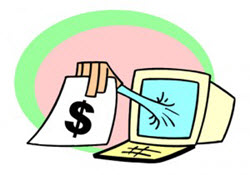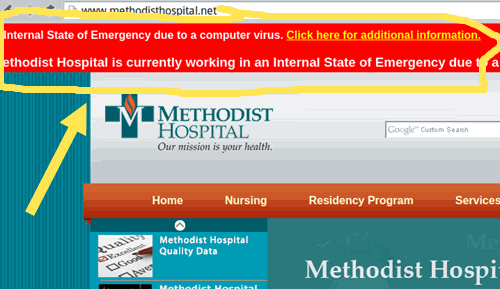
Keeping clients' computers safe and profitable for over 30 years
Home Forms About Current Newsletter subscribe
Search All Articles
Browse by Category

Get Hacked on NYTimes
Ransomware hosted by NY Times, BBC, MSN and more...What is Ransomware
 Ransomware is a type of computer infection that makes your computer unusable until you pay a ransom. In 2013 the trojan Cryptolocker showed the world how to make millions. They encrypted people's hard drives making their data inaccessible. Payment in bitcoin was required to get an unlock key. This unleashed the floodgates and many miscreants began creating all sorts of ransomware and making millions. The FBI and security companies work hard to protect people, but given the enormous profits available, they can't keep up. Attacks are made against both Windows and Mac products. The numbers are increasing rapidly.
Ransomware is a type of computer infection that makes your computer unusable until you pay a ransom. In 2013 the trojan Cryptolocker showed the world how to make millions. They encrypted people's hard drives making their data inaccessible. Payment in bitcoin was required to get an unlock key. This unleashed the floodgates and many miscreants began creating all sorts of ransomware and making millions. The FBI and security companies work hard to protect people, but given the enormous profits available, they can't keep up. Attacks are made against both Windows and Mac products. The numbers are increasing rapidly.Because it is profitable, it is getting optimized. Companies are selling kits that will help less gifted miscreants create better ransomware more quickly.
Recently the Hollywood Presbyterian Medical center paid nearly $17,000 to ransomware hackers to get data back. The Methodist Hospital in Kentucky has declared an Internal state of Emergency after they were hacked and the Hacker demanded about $1,600 in ransom. As of March 25, 2016 they hadn't decided whether to pay. The image below is from their website captured on March 25, 2016. They declare an "Internal State of Emergency"

Most common infection vector
Ransomware can be spread in many ways, but the most common currently, seems to be Malvertising. Legitimate websites support themselves with advertising purchased from many different advertising networks. Those networks get ads from many different advertising agencies. When one gets infected, their ads go out to millions. This month alone, The New York Times, The BBC, MSN, AOL, NFL.com, my.xfinity.com, realtor.com and others have distributed ransomware through advertising on their sites.Prevention
- Keep your software up to date. Especially, your operating system, browser, java, flash, and silverlight. I recommend Ninite Updater for this, in addition to keeping up with Microsoft updates.
- Require manual activation of scripts like flash. I explained how to do this in an article last December.
- Use an Adblocker. I recommend Adblock Plus. I do not want to block all ads because I want sites I visit and get information from to be able to make money and continue to provide the service. But I want to block ads that use a lot of scripts and might be dangerous. Adblock Plus does this.
- Use a good antivirus program. I recommend Eset's Nod32.
- If you have a backup which windows cannot see, then it is probably safe from the encryption. An external flash drive or a network drive can be encrypted with the rest of your data, but a backup from Spideroak which is only seen from inside their software is normally safe.
Further reading
- Ars Technica article on Malvertising ransomware on popular sites.
- Wikipedia article on Ransomware
- NPR article on hospital attack
Date: March 2016

This article is licensed under a Creative Commons Attribution-NoDerivs 3.0 Unported License.